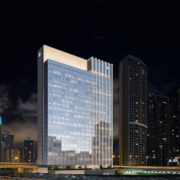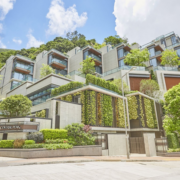Acousticork by Amorim Underscreeds Have a Negative Carbon Balance

A Life Cycle Assessment (LCA) study conducted by Itecons confirms that Acousticork by Amorim U36 and U38 floor mats have a negative carbon balance. These innovative solutions, produced by Amorim Cork Composites, contribute to the performance of the flooring solutions where they are applied, in terms of acoustic insulation and thermal comfort, while at the same time improving air quality.
According to the study conducted by Itecons, Acousticork U36 and U38 underscreeds have a negative carbon balance of -13.6 kg CO₂ eq/ m2 and -24.5 kg CO₂ eq/ m2, respectively. This means that the carbon sequestered by the cork oak forest, associated with the cork used in these products, is greater than the CO₂ emissions resulting from their production.
The Life Cycle Assessment study of the Acousticork U36 and U38 floor mats was conducted by Itecons, in order to determine the environmental impact of the U36 [6/3], U36 [8/4], U38 [12/6] and U38 [17/8] floor mats produced by Amorim Cork Composites. Two Environmental Product Declarations were thereby obtained, which are available in the EPD system.

This study considered the following life cycle modules: Extraction and processing of raw materials (A1), Transport to the factory (A2), Production (A3) and End of life (C1-C4). The LCA study was conducted in accordance with international standards EN ISO 14040, EN ISO 14044 and EN 15804, as well as the requirements specified in the RCP (Rules for Product Categorisation) documents.
The study also calculated the carbon balance of these products, using a methodology supplied by Amorim Cork Composites, which takes into account both the carbon sequestered by the cork oak forest and the GHG emissions from the production stage, calculated using the methodology of the EN 15804 standard.
Acousticork U36 and U38 underscreeds are made from circular economy materials and cork – a 100% natural, reusable and recyclable raw material. They offer high performance and impact resistance, enabling greater durability over time. They are therefore quality options for customers seeking to achieve a balance between performance and environmental sustainability.

The study’s results reinforce Corticeira Amorim’s position in terms of developing a business activity that promotes the conservation of ecosystems and climate regulation since it offers customers products with CO2 sequestration levels that are higher than the emissions associated with their production, as well as offering an alternative to synthetic-based solutions, thereby minimising dependence on the use of fossil fuels. These results also reinforce the company’s commitment to sustainable innovation and the constant search for solutions that benefit both the environment and customers.





